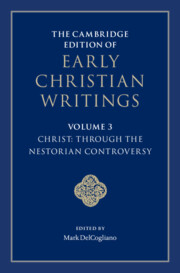Book contents
- The Cambridge Edition of Early Christian Writings
- The Cambridge Edition of Early Christian Writings
- The Cambridge Edition of Early Christian Writings
- Copyright page
- Contents
- Notes on Contributors
- Acknowledgments
- Note on the Texts and Translations
- Abbreviations
- Series Introduction
- Introduction
- Part I The Beginnings of Christology
- Part II Developing Christological Traditions
- 13 Tertullian, Apology 21
- 14 Tertullian, On the Flesh of Christ 1–16 and 24–25
- 15 Tertullian, Against Praxeas 1–4 and 27–30
- 16 Origen, On First Principles 2.6
- 17 Paul of Samosata, Selected Fragments
- 18 Aphrahat, Demonstration 17: On the Son
- 19 Hilary of Poitiers, On the Trinity 9.1–14
- 20 Ephrem the Syrian, Hymns on Faith 4, 10, 24, 31, 36, 51, 54, 77, 78, and 79
- Part III Traditions of Pro-Nicene Christology
- Part IV Controversy over Nestorius
- Suggestions for Further Reading
- Scriptural Index
17 - Paul of Samosata, Selected Fragments
from Part II - Developing Christological Traditions
Published online by Cambridge University Press: 05 February 2022
- The Cambridge Edition of Early Christian Writings
- The Cambridge Edition of Early Christian Writings
- The Cambridge Edition of Early Christian Writings
- Copyright page
- Contents
- Notes on Contributors
- Acknowledgments
- Note on the Texts and Translations
- Abbreviations
- Series Introduction
- Introduction
- Part I The Beginnings of Christology
- Part II Developing Christological Traditions
- 13 Tertullian, Apology 21
- 14 Tertullian, On the Flesh of Christ 1–16 and 24–25
- 15 Tertullian, Against Praxeas 1–4 and 27–30
- 16 Origen, On First Principles 2.6
- 17 Paul of Samosata, Selected Fragments
- 18 Aphrahat, Demonstration 17: On the Son
- 19 Hilary of Poitiers, On the Trinity 9.1–14
- 20 Ephrem the Syrian, Hymns on Faith 4, 10, 24, 31, 36, 51, 54, 77, 78, and 79
- Part III Traditions of Pro-Nicene Christology
- Part IV Controversy over Nestorius
- Suggestions for Further Reading
- Scriptural Index
Summary
In the 260s the recently elected Antiochene bishop Paul of Samosata faced an offensive from fellow Syrian church leaders, ostensibly on account of his theological persuasions. In his Ecclesiastical History Eusebius of Caesarea reports that as soon as it became clear that Paul “held low and base views about Christ, contrary to ecclesiastical teaching, that he was in nature an ordinary human being (koinou tēn phusin anthrōpou genomenou),”1 a first synod was summoned (ca. 264), to which clergymen from across the empire hastened. Shortly after this synod, and probably after a few more, Hymenaeus of Jerusalem and five colleagues composed a letter full of ad hominem attacks against Paul and containing a creed that insisted on the eternity of the Son. Finally, at a synod that gathered in 268/269, Paul was cornered by Malchion, an Antiochene priest of great rhetorical skill, and was deposed.
- Type
- Chapter
- Information
- The Cambridge Edition of Early Christian Writings , pp. 197 - 211Publisher: Cambridge University PressPrint publication year: 2022

